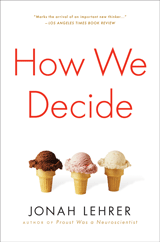One of the interesting subplots of this new research on the intellectual benefits of sadness - it seems to bolster our attention and make us more analytical - is that it helps illuminate the intertwined relationship of mood and cognition. For decades, we saw the mind as an information processing machine; the brain was just a bloody computer with lipid bi-layer microchips. The problem with this metaphor is that machines don't have feelings, which led us to overlook the role of feelings in shaping how we think.
Here's an experiment I described in the depression article:
Last year Forgas ventured beyond the lab and began conducting studies in a small stationery store in suburban Sydney, Australia. The experiment itself was simple: Forgas placed a variety of trinkets, like toy soldiers, plastic animals and miniature cars, near the checkout counter. As shoppers exited, Forgas tested their memory, asking them to list as many of the items as possible. To control for the effect of mood, Forgas conducted the survey on gray, rainy days -- he accentuated the weather by playing Verdi's "Requiem" -- and on sunny days, using a soundtrack of Gilbert and Sullivan. The results were clear: shoppers in the "low mood" condition remembered nearly four times as many of the trinkets. The wet weather made them sad, and their sadness made them more aware and attentive.
Of course, this doesn't mean people in sunny climates always think worse, or that sadness is always the ideal mental state. While negative moods might promote focused attention and rigorous analysis, there's good evidence that happiness promotes a more freewheeling kind of information processing, which leads to more creative insights. Consider the following problem: I'm going to give you three different words, and you have to come with a single word that can form a compound word or phrase with all three. The three words are: AGE, MILE and SAND.
What's the answer? Look here.* If you solved this problem, the answer probably arrived in a flash of insight, popping abruptly into consciousness. According to Mark Jung Beeman and John Kounios, two scientists who have studied the neuroscience of aha moments, the brain is more likely to solve insights when the mind is relaxed, happy and perhaps a little distracted. (They've found, for instance, that subjects in a positive mood solve approximately 20 percent more insight problems than control subjects.) I wrote about their research in the New Yorker in 2008.
Why does happiness and relaxation make us better at solving remote associate problems? Beeman and Kounios describe the insight process as a delicate mental balancing act. (They've watched hundreds of undergraduates solve these word problems in fMRI machines and while wearing EEG headgear.) At first, the brain needs to control itself, which is why areas involved with executive control, like the prefrontal cortex and anterior cingulate, are activated. The scare resource of attention is lavished on a single problem. But then, once the brain is sufficiently focused, the cortex needs to relax, to seek out the more remote associations in the right hemisphere that will provide the insight.
And that's why relaxation and happiness are so helpful: these moods make us more likely to direct the spotlight of attention inwards, so that we become better able to eavesdrop on the quiet yet innovative thoughts we often overlook. (That's why so many of my best ideas often come during warm showers.) In contrast, when people are diligently focused (and perhaps a little melancholy), their attention tends to be directed outwards, towards the details of the problem they're trying to solve. While this pattern of attention is necessary when solving problems analytically, it actually prevents us from detecting those unlikely connections that lead to insights and epiphanies. (William James referred to insights as emanating from the peripheral "fringe" of consciousness, which is why they're so easy to ignore when we're staring straight ahead.)
The moral is that emotions influence how we process and pay attention to information, and that different kinds of cognitive tasks benefit from different moods. When we're editing our prose, or playing chess, or working through a math problem, we probably benefit from a little melancholy, since that makes us more attentive to details and mistakes. In contrast, when we're trying to come up with an idea for a novel, or have a hit a dead end with our analytical approach to a problem, then maybe we should take a warm shower and relax. The answer is more likely to arrive when we stop thinking about our problem. (It should also be noted, of course, that the same mental states can be induced with drugs, which is why so many artists experiment with benzedrine, marijuana, etc. They self-medicate to achieve the ideal mental state.)
If you're interested in thinking more about the tangled relationship of mood, cognition and creativity, I'd definitely recommend The Midnight Disease, by Alice Flaherty. It's a fascinating glimpse into the terrors of manic depression, and how an awful, awful mental illness can lead to a surfeit of creative production.
Update: I've received a few emails asking how this research on creative insights squares with the correlation between unipolar/bipolar depression and artistic success, at least as documented by Redfield Jamison and Andreassen. My own hunch is that, while we indulge in romantic myths about poems being generated during daydreams and long walks (see, for instance, Coleridge and Kubla Kahn), the reality of artistic production is far less leisurely. Good art is a relentless grind, requiring an inexhaustible attention to details and mistakes. Perhaps this is why a depressive mindset can be so helpful, and why so many successfful artists suffered from manic depression, in which periods of euphoric free-association are offset by prolonged and horrific states of anguish. But that's all utter speculation.
*Stone: milestone, sandstone, Stone Age.







Comments (21)
Interesting. But could you supply some references that the right hemisphere is indeed responsible for "more remote associations"?
Posted by: Gerontius | March 3, 2010 12:29 PM